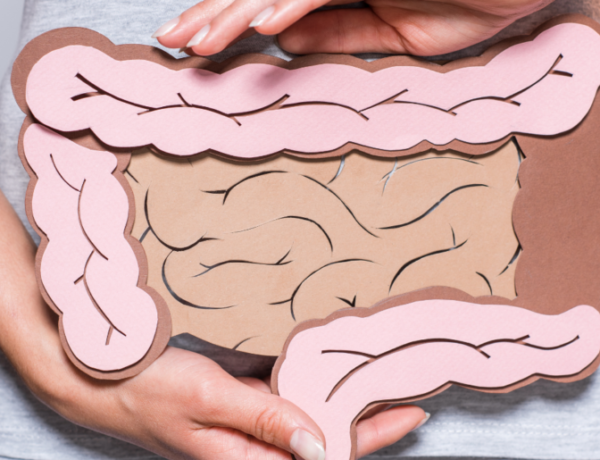Amazing Links between the Digestive System, the Mind and Moods
You may be surprised by this title but, you may be even more surprised to learn that there are more receptor sites for Serotonin in the gut (small intestine and the colon) than there are in the brain! Serotonin is a neurotransmitter secreted by the body that affects our mood. Basically if we are lacking Serotonin, we may feel depressed. The conventional medicine approach to a lack of Serotonin is to give SSRI medication (anti-depressant medication). We as Naturopath’s are now saying, “Let’s have an in-depth look at the digestive function to improve Serotonin absorption.”
Your Gut: Your Starting Point for Good Health!
 I always tell my patients that, “You are what you eat,” but more specifically and more importantly, “You are what you digest.” Indeed, if you eat the typical American diet of bagels, pizzas, diet sodas, and ice cream, none of which contain anything nutritious, then there is NO chance for your gut to be healthy. But let us say that you are eating healthy foods such as fresh fruits, vegetables, whole grains, healthy meat and fish, and that you drink lots of water but, you are NOT digesting these foods properly, then you are still malnourished.
I always tell my patients that, “You are what you eat,” but more specifically and more importantly, “You are what you digest.” Indeed, if you eat the typical American diet of bagels, pizzas, diet sodas, and ice cream, none of which contain anything nutritious, then there is NO chance for your gut to be healthy. But let us say that you are eating healthy foods such as fresh fruits, vegetables, whole grains, healthy meat and fish, and that you drink lots of water but, you are NOT digesting these foods properly, then you are still malnourished.
There are many reasons why you may not digest properly. One reason may be that you are intolerant to certain foods. For example, gluten intolerance is very common, and may cause irritation and malabsorption. Another reason maybe that you are lacking digestive enzymes or, a third reason maybe that you have a disturbed digestive flora. When your gut is irritated (by gluten for example), it makes your gut lining swollen, red, and at times, even painful. In this case, you have what we call a “leaky gut syndrome” . What this means is that the inside of your gut is so irritated that the cells have become enlarged, and thus allowing non-digested particles of food to enter the blood stream. This is how you may develop allergies, fatigue, or chemical sensitivities. When your gut lining is irritated, you also have LESS receptor sites for hormones, enzymes and / or neurotransmitters. As a consequence, you may lack hormones, enzymes or neurotransmitters. The common denominator of these insufficiencies is actually, as you can now understand it, your disturbed digestive system. This is why the FIRST THING I need to do when assessing someone with mood disorders is to test their digestive system.
Assessment of the Digestive System Health
Whenever a patient comes to my office complaining about mood disorders, I start by testing their digestive system. I use a specialized test that tests both stool and saliva. This test sample collection is done in the comfort of your home. This test reveals many things: the composition of your bacterial flora, the lack of digestive enzymes, the invasion of different bacteria, fungi, and parasites. But, it also contains several MARKERS that indicate inflammation of the small intestines and / or the colon. Lastly, this test analyses food intolerances: soy, dairy, gluten and eggs. Thus, when we obtain the results, I can already guide my patients to what choices of foods are best for them. And if necessary, address any microbial infections that may be present.
It is amazing to hear what my patients describe as it concerns the numerous changes they feel by simply removing the food(s) that is detrimental for them. For the majority of them, the nearly immediate improvement of their digestive symptoms, such as gas and bloating, belching, acid reflux, diarrhea or constipation is remarkable. For some, it improves their quality of sleep, it reduces their anxiety or nervousness, and for others it improves their mood. They don’t feel as irritable, depressed, or anxious. Their mind becomes clearer; they have less “foggy brain” and better concentration. They feel better, lighter, and happier. For others, it may also clear their allergies.
Gut and Mood Disorders
When the digestive system is unhealthy, which is in my opinion, the case for the majority of the population, it can significantly affect brain function. In her book “Gut and Psychology Syndrome,” Dr. Natasha Campbell McBride, a brilliant nutritionist doctor, cites the French psychiatrist Philippe Pinel (1745-1828), who after working with mental patients for many years, concluded way back in 1807: “The primary seat of insanity is generally in the region of the stomach and the intestines.” A rhetorical question for my readers: Do you really think that modern psychiatrist would EVER look into their patient’s digestive system?
Dr. Campbell practices in England and specializes in Autism. I met her last year when I attended the 9th annual conference of Wise Traditions in San Francisco in November 2008. Dr. Campbell explained that the common denominator between Depression, ADD, ADHD, Dyspraxia, Dyslexia, or Autism lies in the digestive system. Hence, when a person does NOT digest a food properly, this food starts fermenting and creating alcohol-like and opiate-like substances. Everyone knows that alcohol and opium affect behavior and mood. Simply put, people who do not digest certain foods are drugged or are “high” on substances secreted by their own gut, which in fact modifies their behavior. We can say that agitated children, such as ADD kids, are simply “on drugs” …the drugs that are produced by their own disturbed digestive flora. This explains why these children may be so hyper, or have anti-social behavior, or why their mood is so unstable. These kids are actually “poisoned” by their own body fermenting food by-products. Simply by removing sugar, sodas, gluten, and dairy, we can help them to calm down in just a few days, so they start behaving almost as normal kids. The trick is to help them discover other foods, as very often they are actually addicted to the same very foods that are causing them so much harm.
Dr. Campbell presented a case study to us of a 9 year old boy who had been diagnosed Autistic at the age of 2½. He was also suffering from Grand Mal Seizures, Type 1 Diabetes, and multiple allergies. He was receiving 2 shots of insulin per day, was on anti-seizure medications and anti-allergy medications. His diet consisted of corn dogs, pasta and cereals. He refused to eat any fruit or vegetables, meat or fish. After 2 years of working with Dr. Campbell, changing his diet, and working on his digestive system, this young boy was able to be in a regular school with no more symptom of Autism at all. He had no more allergies, had only Petit Mal seizures, and needed insulin shots ONLY on the occasion if he ate sugar! He had many friends and became an easy child for his parents. A few centuries ago, these children were considered “crazy” and put into an institution. Nowadays, they are put on heavy drug medications which numb them down. But with the work of Dr. Campbell and others like her, they are able to give back to these children a normal life. It does not get more remarkable than this!
What to Do to Improve Your Gut
The real clinical experiences of Dr. Campbell are applicable to many adults suffering from mood disorders. In my experience, it is very common for patients to start feeling better as soon as I tell them to remove certain foods and start working on their digestive tracts. Here are the many things that can be done to improve your gut health and mood at the same time:
 1. REMOVE SUGAR: Sugar is your WORST enemy! You have heard me state that fact before. Yes, it tastes good, but its digestion creates fermentation. When fermentation occurs, then it creates a favorable terrain for unfriendly bacteria and fungi to develop. The unfriendly bacteria impair digestive enzymes, and the fungi modify the pH of the gut so that other unfriendly microbes, such as parasites start developing. We are all exposed to bacteria, fungi and parasites, but if our gut is healthy, then these “bugs” don’t invade us, they are simply destroyed and eliminated by the friendly bacteria. But when the friendly bacteria are not present in a sufficient numbers or if they have been destroyed by repetitive antibiotic therapy, then the unfriendly bacteria start developing.
1. REMOVE SUGAR: Sugar is your WORST enemy! You have heard me state that fact before. Yes, it tastes good, but its digestion creates fermentation. When fermentation occurs, then it creates a favorable terrain for unfriendly bacteria and fungi to develop. The unfriendly bacteria impair digestive enzymes, and the fungi modify the pH of the gut so that other unfriendly microbes, such as parasites start developing. We are all exposed to bacteria, fungi and parasites, but if our gut is healthy, then these “bugs” don’t invade us, they are simply destroyed and eliminated by the friendly bacteria. But when the friendly bacteria are not present in a sufficient numbers or if they have been destroyed by repetitive antibiotic therapy, then the unfriendly bacteria start developing.
2. REMOVE DAIRY AND GLUTEN if you are intolerant to these foods (AFTER being tested). I believe that we have an epidemic of dairy and gluten intolerances which creates so many health issues such as chronic infections (sinusitis, bronchitis, ear infections, bladder infection, yeast infection…) but also lowers immunity, induces chronic fatigue, skin diseases, IBS (Irritable Bowel Syndrome), IBD (Irritable Bowel Disorders) and mood disorders. Removing these two food groups is quite often a key necessity for my patients to improve their digestive health.
3. TAKE GOOD PROBIOTICS: Because of pasteurization, our modern society has deprived us from exposure to friendly bacteria and probiotics. This is one reason why I am an advocate of reintroducing fermented foods in our diet. However, even if you eat fermented foods regularly, such as homemade plain yogurt, raw sauerkraut or Kim Chi, Kefir, or if you drink Kombucha tea, I still recommend that you supplement with a good probiotic. I personally recommend Probiotic 50 Billions: 1 or 2 capsules a day by Advanced Naturals, or Probiotic Synergy Powder or Capsules: 1 capsule or 1 teaspoon per day by Designs For Health.
4. TAKE DIGESTIVE ENZYMES: If you have difficulties digesting food in general, you need to take 2 to 4 Digestzymes from Designs For Health with every single meal. This product contains digestive enzymes, plus Betaine Hydrochloride (for the stomach), Pancreatin (for the pancreas), and bile extract (for the gallbladder) so it covers every single part of the digestive process, from stomach to colon including Liver, Gallbladder and Small Intestines. When a patient suffers from acid reflux or G.E.R.D (Gastro Esophageal Reflux Disorder) I recommend adding another capsule of Betaine Hydrochloride from Designs For Health with every main meal.
5. OTHER SUPPLEMENTS: Depending on the case, I may also recommend L-Glutamine or GI Revive which are useful supplements to help repair the mucosa of the digestive system that was damaged by the years of irritation due to poor diet and / or food intolerances. If through the testing procedure I found that my patient had an invasion of parasites, bacteria or fungi, then I would recommend supplements such as Allicillin, an extremely concentrated form of garlic, Oil of Oregano, or GI Microb-X, all of which target precisely the type of microbe found during testing. All these supplements are from Designs For Health, a line of product that I trust because of their high quality as well as the numerous research done on every single ingredient of the products.
6. GET COLONICS: Colon Hydrotherapy is done by certified professionals that are trained accordingly to give a treatment that cleanses the colon. It’s a gentle technique whereby a machine inserts lukewarm water into the colon very slowly. Then, the colon hydro therapist massages the abdomen of the patient to help her / him release the water containing undesirable debris and fecal material. Even someone who is not constipated can benefit from this technique because it helps cleansing the lining of the colon of old fecal material, fungi, parasites, and overgrowth of bacteria.
7. DO A LIVER GALLBLADDER FLUSH: This is a procedure that is done at home. It requires you to prepare a week prior to doing the actual flush by drinking unfiltered and unsweetened Organic Apple Juice. Then, one evening the person drinks a mixture of ½ cup of unrefined Olive Oil mixed with ½ cup of Lemon Juice or Grapefruit Juice. This “beverage” forces the Gallbladder to contract and squeeze out undesirable debris made up of cholesterol, dead cells, toxins, heavy metals, and so forth. These toxins are then excreted through the digestive tract and eliminated through the stools. It is an extremely efficient and important process to cleanse the Liver and the Gallbladder on a regular basis, as these organs act as the filters of our bodies, filtering the many toxins we are constantly exposed to.
After these measures and supplements have been followed for a while, the digestion improves, and then the mood improves too. If a person still complains about depression, anxiety, or irritability then I address neurotransmitters deficiencies by using supplements that are precursors to neurotransmitters. They can be Amino Acids, Fish Oils, Vitamins and Minerals, or even certain Herbs that help the body to produce neurotransmitters. I have different methods of assessing neurotransmitters deficiencies, which will be discussed in Part 2 of this article in the next Health Awareness Newsletter.
Yours in Health,
Béatrice Levinson, Naturopath
Videoconference & Phone Appointments Available
………………………………………………………………………………………………………………….
The entire contents of Health Awareness are based upon the opinions of Béatrice Levinson, Naturopath, unless otherwise indicated. Individual articles are based upon the opinions of the respective author, who retains copyright as marked. The information on this website is not intended to replace a one-on-one relationship with a qualified health care professional and is not intended as medical advice. It is intended as an offering and sharing of knowledge and information from the research and experience of Béatrice Levinson, Naturopath within the U.S. and Europe. Béatrice Levinson, Naturopath encourages you to make your own health care decisions based upon your research and in partnership with a qualified health care professional.
© Copyright 2011 Béatrice F. Levinson, Naturopath. All Rights Reserved. This content may be copied in full, with copyright, contact, creation and information intact, without specific permission, when used only in a not-for-profit format. If any other use is desired, permission in writing from Béatrice Levinson is required.










No Comments